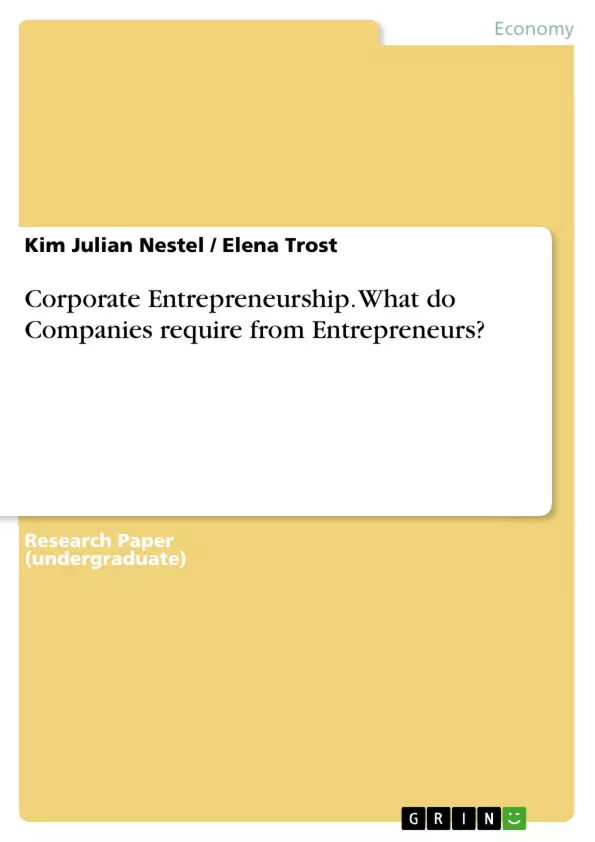Within a world of emerging global markets and rapid technological development, there is a strong demand for entrepreneurship within established companies in order to stay competitive. According to different studies, there is a positive linkage between Corporate Entrepreneurship (CE) and companies’ performance, which leads to a strong demand from organizations to foster their entrepreneurial culture. The recruitment and selection function within Human Resource Management (HRM) is an essential driver to attract, develop, and retain entrepreneurial people within corporations. The literature proposes that companies should match their selection criteria to the identified dimensions of Entrepreneurial Orientation (EO).
However, there is a lack of research if companies have specific HRM practices to select and retain entrepreneurial people. By investigating the recruitment requirements and development possibilities of Swedish-based companies, this study contributes empirical knowledge to the topic of how companies deal with HRM and CE. This information improves the understanding in the Corporate Entrepreneurship literature.
Table of Contents
- ACKNOWLEDGEMENTS
- ABSTRACT
- LIST OF FIGURES
- LIST OF TABLES
- LIST OF ABBREVIATIONS
- 1.0 INTRODUCTION
- 1.1 Problem Statement
- 1.2 Purpose and Research Question
- 1.3 Outline of the Thesis
- 2.0 THE IMPORTANCE OF ENTREPRENEURSHIP
- 2.1 Corporate Entrepreneurship
- 2.2 The Role of Human Resource Management in Corporate Entrepreneurship
- 2.3 Entrepreneurship Orientation
- 2.3.1 Innovativeness
- 2.3.2 Risk-taking
- 2.3.3 Proactiveness
- 2.3.4 Soft Skills
- 2.3.5 Management Skills
- 2.4 Summary
- 3.0 RESEARCH METHODOLOGY
- 3.1 Literature Review
- 3.2 Research Design
- 3.3 Sample
- 3.4 Data Collection
- 3.4.1 Pilot Study
- 3.4.2 Interview Schedule
- 3.4.3 Main Study
- 3.4.4 Secondary Data
- 3.5 Data Analysis
- 3.6 Validity
- 3.7 Reliability
- 3.8 Limitations
- 4.0 EMPIRICAL RESULTS
- 4.1 Definition of Entrepreneurial Culture
- 4.2 Importance of Entrepreneurial Culture
- 4.3 Characteristics of Entrepreneurial People
- 4.3.1 Innovativeness
- 4.3.2 Risk-taking
- 4.3.3 Proactiveness
- 4.3.4 Soft Skills
- 4.3.5 Management Skills
- 4.4 Human Resource Management
- 4.4.1 Recruitment and Selection
- 4.4.2 Training and Development
- 4.5 Summary
- 5.0 DISCUSSION
- 5.1 Definition of Entrepreneurial Culture
- 5.2 Importance of Entrepreneurial Culture
- 5.3 Characteristics of Entrepreneurial People
- 5.3.1 Most Important Characteristics in General
- 5.3.2 Most Important Characteristics per Company Size
- 5.4 Human Resource Management
- 5.4.1 Recruitment and Selection
- 5.4.2 Training and Development
- 5.5 Summary
- 5.6 Universities enhance Company Performance
- 5.7 Other Findings and Observations
- 6.0 CONCLUSION
- 6.1 Contributions
- 6.1.1 Managerial and University Implications
- 6.2 Limitations and Future Research
- 7.0 LIST OF REFERENCES
- 8.0 APPENDIX
- 8.1 Development of the Interview Schedule: Version 1-Version4
- 8.2 Final Interview Schedule
- 8.3 Example Pilot Interview: ZEB
- 8.4 Example Interview: Ericsson
- 8.5 Responses Question 1
Objectives and Key Themes
This master's thesis examines the link between Corporate Entrepreneurship (CE) and Human Resource Management (HRM) practices in Swedish companies. It investigates how companies recruit, develop, and retain entrepreneurial individuals to foster an entrepreneurial culture. The thesis aims to provide empirical evidence on how companies manage HRM in the context of CE, contributing to the understanding of this field in the literature.
- The importance of fostering an entrepreneurial culture within corporations.
- The role of HRM in attracting, developing, and retaining entrepreneurial individuals.
- The identification of specific HRM practices employed by companies to select and retain entrepreneurial people.
- The relationship between company size and the importance of certain entrepreneurial characteristics.
- The implications of the findings for both management and universities.
Chapter Summaries
The thesis begins by introducing the problem statement, purpose, and research question. It then explores the importance of entrepreneurship, particularly within corporations, highlighting the role of HRM in fostering an entrepreneurial culture. The study also defines key elements of entrepreneurial orientation, including innovativeness, risk-taking, proactiveness, soft skills, and management skills. The methodology chapter details the research design, sample, data collection methods, and data analysis techniques. The empirical results section presents findings regarding the definition and importance of entrepreneurial culture, the characteristics of entrepreneurial people, and the HRM practices employed by companies. The discussion chapter analyzes the findings, highlighting the significance of entrepreneurial culture, the most important entrepreneurial characteristics, and the specific HRM practices employed by companies. Finally, the conclusion summarizes the contributions of the study, outlines its limitations, and suggests directions for future research.
Keywords
This research focuses on the connection between Corporate Entrepreneurship (CE) and Human Resource Management (HRM) practices in Swedish companies. The key terms and concepts explored include entrepreneurship education, entrepreneurship orientation, innovation, and recruitment and selection strategies.
- Quote paper
- Kim Julian Nestel (Author), Elena Trost (Author), 2016, Corporate Entrepreneurship. What do Companies require from Entrepreneurs?, Munich, GRIN Verlag, https://www.grin.com/document/336180



